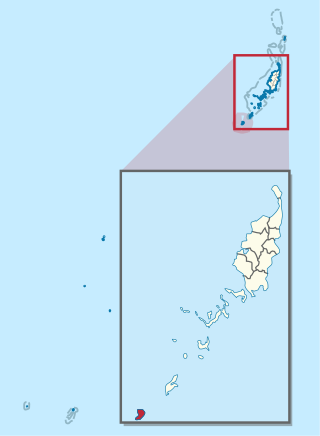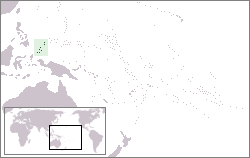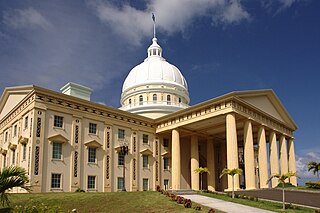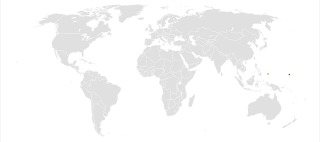Related Research Articles

Micronesia is a subregion of Oceania, consisting of about 2,000 small islands in the Northwestern Pacific Ocean. It has a close shared cultural history with three other island regions: Maritime Southeast Asia to the west, Polynesia to the east, and Melanesia to the south—as well as with the wider community of Austronesian peoples.

Palau, officially the Republic of Palau, is an island country in the Micronesia subregion of Oceania in the western Pacific. The republic consists of approximately 340 islands and connects the western chain of the Caroline Islands with parts of the Federated States of Micronesia. It has a total area of 466 square kilometers (180 sq mi), making it one of the smallest countries in the world. The most populous island is Koror, home to the country's most populous city of the same name. The capital Ngerulmud is located on the largest island of Babeldaob, in Melekeok State. Palau shares maritime boundaries with international waters to the north, the Federated States of Micronesia to the east, Indonesia to the south, and the Philippines to the northwest.

Palau was initially settled around 1000 BC.

Pacific Islanders, Pasifika, Pasefika, Pacificans or rarely Pacificers are the peoples of the Pacific Islands. As an ethnic/racial term, it is used to describe the original peoples—inhabitants and diasporas—of any of the three major subregions of Oceania.

"Belau rekid" is the national anthem of Palau. Officially adopted in 1981, the music was composed by Ymesei O. Ezekiel, to which the combined words of several authors were set.

The Flag of Palau was adopted on 1 January 1981, when the island group separated from the United Nations Trust Territory. As with the flags of several other Pacific island groups, light blue is the color used to represent the ocean and the nation's place within it. While this puts Palau in common with the Federated States of Micronesia and other neighboring island groups, the disc on the flag is off-centre like that of the flag of Bangladesh, but in this case the disc represents the moon instead of the sun. The current flag was introduced in 1981 when Palau became a republic.
Palauan is a Malayo-Polynesian language native to the Republic of Palau, where it is one of the two official languages, alongside English. It is widely used in day-to-day life in the country. Palauan is not closely related to other Malayo-Polynesian languages and its exact classification within the branch is unclear.

Peleliu is an island in the island nation of Palau. Peleliu, along with two small islands to its northeast, forms one of the sixteen states of Palau. The island is notable as the location of the Battle of Peleliu in World War II.

Angaur, or Ngeaur in Palauan, is an island and state in the island nation of Palau.
The Micronesians or Micronesian peoples are various closely related ethnic groups native to Micronesia, a region of Oceania in the Pacific Ocean. They are a part of the Austronesian ethnolinguistic group, which has an Urheimat in Taiwan.

Roman Tmetuchl was a Palauan political leader and businessman. He grew up in Japanese-controlled Palau and joined the Kempeitai, the Japanese secret police, during World War II. After the war, he became the leader of Palau's Liberal Party. He worked in the Congress of the Trust Territory of the Pacific Islands from 1964 to 1978 and advocated for Palau gaining a separate status from the rest of Micronesia. He became governor of Airai and engaged in three unsuccessful Palauan presidential campaigns. As a businessman, Tmetuchl led several construction projects for his business holdings and for the Palauan community, including the Palau International Airport and a Seventh-Day Adventist clinic.

The following outline is provided as an overview of and topical guide to Palau:

The Belau National Museum (BNM), previously Palau Museum, is a museum in Koror, Palau. It is the oldest continuously run museum in Micronesia.

Ngerulmud is the seat of government of the Republic of Palau, an island nation in the Pacific Ocean. It replaced Koror City as a capital in 2006. The settlement is located in the state of Melekeok on Babeldaob, the country's largest island, located 20 kilometers northeast of Koror City and 2 km northwest of Melekeok City. It is the least-populous capital city of a sovereign nation in the world.
There is a small Japanese community in the Pacific Island country of Palau, which mainly consists of Japanese expatriates residing in Palau over a long-term basis. A few Japanese expatriates started to reside in Palau after it gained independence in 1994, and established long-term businesses in the country. Japanese settlement in Palau dates back to the early 19th century, although large scale Japanese migration to Palau did not occur until the 1920s, when Palau came under Japanese rule and administered as part of the South Seas Mandate. Japanese settlers took on leading administrative roles in the Japanese colonial government, and developed Palau's economy. After the Japanese surrender in 1945, virtually all of the Japanese population was repatriated back to Japan, although people of mixed Japanese-Palauan descent were allowed to remain behind. People of Japanese-Palauan descent constitute a large minority of Palau's population as a result of substantial intermarriage between the Japanese settlers and Palauans. They generally identify with, conforming to cultural norms and daily lives with the Palauans.

The Federated States of Micronesia and Palau share very good relations, as they are both bound by Compacts of Free Association with the United States. Palau decided not to join Micronesia when it became independent in 1986, due to language and other cultural differences. Palau became independent in 1994. Micronesian citizens may stay one year in Palau without a visa and a Palauan citizen may stay in Micronesia indefinitely without a visa. The two countries support each other as well as the United States and the Marshall Islands, another country in free association with the United States. The two countries also often support Israel, similar to the United States and the Marshall Islands.
The sport of baseball is widely played in Palau, having been introduced by the Japanese during their occupation of the island nation. The highest level of league play in Palau in represented by Palau Major League (PML), which is overseen by the Belau Baseball Federation. The country is represented in international play by the Palau national baseball team.

Diplomatic relations are maintained between Japan and Palau, a small island country in the western Pacific Ocean that was once a Japanese colony. There is a Japanese embassy on the Palauan island of Koror and a Palauan embassy in Tokyo.

Oceanian culture encompasses the collective and diverse customs and traditions of art, architecture, music, literature, lifestyle, philosophy, politics and religion that have been practiced and maintained by the many ethnic groups of the geographical region of Oceania since prehistory. Cultures of Oceania reflect not only that of the region's indigenous peoples, but also the cultures brought by European colonisation and the United States, particularly through mass culture such as cinema and TV. Oceania is commonly divided into four geographic sub-regions, characterized by shared cultural, religious, linguistic, and ethnic traits: Australasia, Melanesia, Micronesia, and Polynesia. Most Oceanian countries are multi-party representative parliamentary democracies, and tourism is a large source of income for the Pacific Islands nations.
Palauan nationality law is regulated by the 1980 Constitution of Palau, as amended; the 1994 Palau Citizenship Act, and its revisions; and international agreements entered into by the Palauan government. These laws determine who is, or is eligible to be, a national of Palau. The legal means to acquire nationality, formal legal membership in a nation, differ from the domestic relationship of rights and obligations between a national and the nation, known as citizenship. Palauan nationality is typically obtained either on the principle of jus soli, i.e. by birth in Palau or under the rules of jus sanguinis, i.e. by birth abroad to parents with Palauan nationality. It can be granted to persons with an affiliation to the country through naturalization.
References
- Chronology for Palau and Airai
- Birgit Abels, Performing Palauan Identity (open-access article in New Zealand journal)
- Birgit Abels, Sounds of articulating identity. Tradition and transition in the music of Palau, Micronesia. Berlin: Logos 2008. ISBN 978-3-8325-1866-0